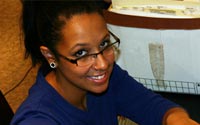
Brianna Weeks is in her last semester at Northern Arizona University, a time seniors typically spend focusing on graduation and formulating a career path. Instead, she is spending most of her time focusing on someone else’s future—someone she’s never met.
Weeks is part of the Arizona Innocence Project at NAU, a team comprised of undergraduate and graduate students who investigate inmates’ claims of wrongful conviction.
She works through cases with Robert Schehr, professor of criminology and criminal justice at NAU and executive director for the project, as part of her studies in social and community service and criminal justice.
To be involved in the project requires substantial commitment—each week includes three hours of coursework, hour-long team meetings with Schehr and six hours in the office plus additional time for investigation.
Seventeen boxes of documents just arrived for a new case, and Weeks started poring over each page as she hones her skills in criminal procedure.
And while she won’t see the end result—most case investigations last between six and nine years—she is entrenched in finding evidence that supports the inmate’s claim of innocence.
The time and work involved sounds overwhelming, but it’s exactly the opportunity that Weeks sought to prepare her for a future as a criminal defense attorney.
“I was working full time and going to NAU online when I started researching innocence projects,” she says. “Innocence work is the reason I want to go to law school, it’s the driving force for me wanting to be a lawyer. The reason I moved to Flagstaff is to get involved in this project.”
Innocence projects are offered at universities around the country but Weeks knew NAU’s is different.
“The innocence project here is unique because we don’t have a law school affiliation and most of the network projects do,” Schehr says. “We work very hard to select students in and make sure they know their stuff.”
Once students complete NAU’s Criminal Procedure course and enroll in Investigating Wrongful Conviction, they get a chance at looking into a real case.
Both classes instill in students a solid understanding of criminal procedure that makes them exceptional sleuths—skills necessary for a career in law, police work and investigation, and the very skills that, according to Schehr, reposition the student’s point of view.
“Because our students come out of social science training, they begin to see and think outside the box,” he says. “They catch problems that you wouldn’t expect undergrads to catch. Things pop off the page.”
The case investigation entails reading police and autopsy reports, entire trial transcripts, pre-trial motions and post-conviction appeals. Students interact directly with clients and their family members, police officers, forensic scientists and private investigators. They work with lawyers who act as mentors, vigorously press them on case details and teach them how to develop briefs.
Essentially, it allows students to take what they are going through in case law, learning and reading, Schehr says, and have that culminate in practice.
“And it gives students a chance to be part of something much bigger,” he says. “When students meet an exoneree, they feel it. Their work matters.”
But conducting a thorough investigation on behalf of a client requires resources, and funding can be a challenge.
Since the project was established in 2002, it has received support from the American Bar Foundation, NAU’s Parent Leadership Council and various foundations, along with indirect support from the university. Local attorneys have provided pro bono services in the courtroom and the classroom.
A recent grant award from the U.S. Department of Justice is about to give the project a significant boost. The $242,322 grant, one of only 10 annual awards given nationally, will enable the project to employ a full-time attorney and hire the services of a private investigator.
And while the Dept. of Justice may seem an unlikely partner to fund an innocence project, Schehr says that ensuring the actual perpetrator of a crime is in custody is in the best interest of everyone.
Advancements in forensic sciences including DNA analysis and composite bullet lead analysis have led to convictions being overturned, but not every case involves that clear-cut physical evidence. In fact, Schehr says, more than 80 percent of cases in which inmates proclaim innocence do not involve DNA.
“The more nationally we are exposing wrongful convictions, people are getting concerned,” Schehr says. “You can’t say any longer that this is just a one-off event. It’s not the bad apple. This is a systemic problem.”



